-By Felix Douglas
The Federal Government has declared 2021 as a decade of gas and putting things in place within its powers to ensure the vision is actualized. Nigeria is 9th in the world in terms of gas reserves; the country has more gas than oil.
To this end, the National Center for Women Development (NCWD) partnered with Zigma Gas Limited, an indigenous gas giant to launch Nigerian Women for Liquefied Petroleum Gas at the National Centre for Women Development in Abuja. The event was organised to provide awareness for Nigerian women and find a lasting solution to household energy challenges such as accessibility, impacting of fuel shortages and loss of lives arising from use of alternative energy.
In her speech, the Director General (DG) of NCWD, Mary Ekpere-Eta gave a brief background of the initiative which is to encourage women to have access to cleaner energy source. The wife of the Minister of State for Petroleum Resources and a representative of the First Lady of Kebbi State were at the epoch event.
A presentation and flag off for women in Liquefied Petroleum Gas (LPG) was presented by a representative of Zigma Gas Limited to sensitize women on the benefits of LPG and how it can better the lives of people.
Zigma Gas Limited is a technical company offering various services to the gas sector such as advocacy, training, advisory, distribution and LPG awareness with capacity and technical competence of existing facilities.
It is also a LPG distribution and cylinder manufacturing company which offers benefits of clean, LPG modern fuel to homes and businesses across Africa.
The company was incorporated in 2008 and significantly, a fully owned Nigerian company, it is actively involved in oil and gas and has a strong foothold in one of the world’s most lucrative gas sector which includes trading, marketing, oil producing and consuming distribution, logistics, marine services and strategically positioned in the country. It has operations and offices in Lagos, Imo, Port-Harcourt and Abuja.
Over the years, the management of Zigma Gas Limited has carefully cultivated relationship with some of the largest players on the international oil scene and can boast of a strong network of local contacts in the country making the company poised to consistently exceed its revenue projections. Its collaboration with a couple of other local and international trading outfits has been of an added advantage to the company to increase its level of expertise in discharging its duties as a team and company effectively.
LPG Landscape in Nigeria
Total per capita usage of gas in Nigeria is currently around 0.5 kg per annum compared to South Africa’s consumption of 18.25 kg per annum. The long-term future is attractive. Zigma Gas Limited believes that this can be turned into a successful pan African business-line with a strong asset base.
Nigeria exported 2.8mtpa of LPG as at 2010
Total consumption as at 2010 stands at 75,000tons per annum
Local consumption for LPG is 3% of total production
Market limited by lack of cylinders and port infrastructure
Total cylinder population in Nigeria stands at less than 1 Million half of which are rusty and unusable.
Indonesia; China; Malaysia and Philippines implemented programs and spent millions of dollars in subsidy, growing the LPG market to phenomenal levels within a short period.
Approximately 1.5 million people die young each year from avoidable respiratory ailments associated with cooking on firewood or kerosene.
Rural women in Nigeria often cook with infants close-by or on their backs, exposing both to toxic fumes. The risk of developing emphysema is even higher than for people who smoke. Half of those who die are children younger than five.
Kerosene stoves are the cause of the loss of many urban homes and deaths as the purchase of contaminated kerosene leads to explosion of the stove and in many instances the release of poisonous fumes.
Benefits of LPG to the economy
Making LPG accessible to Nigerians
Creation of more jobs for Nigerians
Addition to the Nations GDP
Technical capacity building for artisans and industry stakeholders
Contributing to the saving of over $1bn per annum in kerosene subsidy
Saving of the country’s forest resources
LPG is versatile, clean and low on greenhouse gas emissions, it is an ideal fuel for cooking and heating, odourless and burns cleanly, producing no smoke or fumes beyond ordinary combustion gases (water, carbon dioxide and carbon monoxide).
Advantages of LPG
With the use of LPG, there is comfort of knowing that it has low greenhouse gas emissions and is an environmentally positive fuel choice, it helps to ensure Nigeria meets its commitments to the Kyoto climate change agreement.
The Ministry of Petroleum Resources LPG Framework
Statistics
Onitsha, Kaduna, Aba and Umuahia placed top four of the five as most polluted as cities in Africa. Desertification rates up to 3.4% annually. Greenhouse gas emission at approximately 200 million tons per annum, 87% of the population relies on kerosene and firewood for household energy and approximately 40.6 million youths currently unemployed.
Objectives of DLPG Interventions
Environmental preservation:
Contributes to Nigeria’s reduction of Greenhouse gas emission under the INDC’s Paris Climate Change Agreement and curbs national rate of deforestation.
Social Stimulation:
Improves standards of living in rural communities, creating an estimated 7,000 job opportunities for the unemployed and financial inclusion for women and youths.
LPG Utilization:
Attain an overall 5,000,000, MT LPG within 10 years with fiscal transformation.
Reduction of FOREX dependency through reduced gasoline and LPG importation.
The overall benefits of LPG
Achievement of the Paris agreement, creation of an estimated 700,000 employment opportunities, human capacity development with estimated 750,000 women and youths trained on domestic and autogas cylinder handling and LPG sales.
There is also economic and social growth, reduction in GHG emissions, achievements of ECOWAS recirculation mandate for 2020, FINTECH inclusion and reduction of FX utilization on gasoline imports.


Comment here